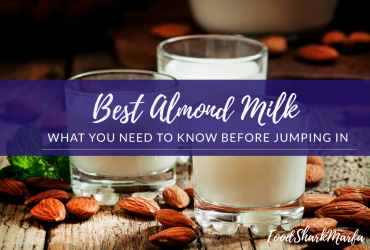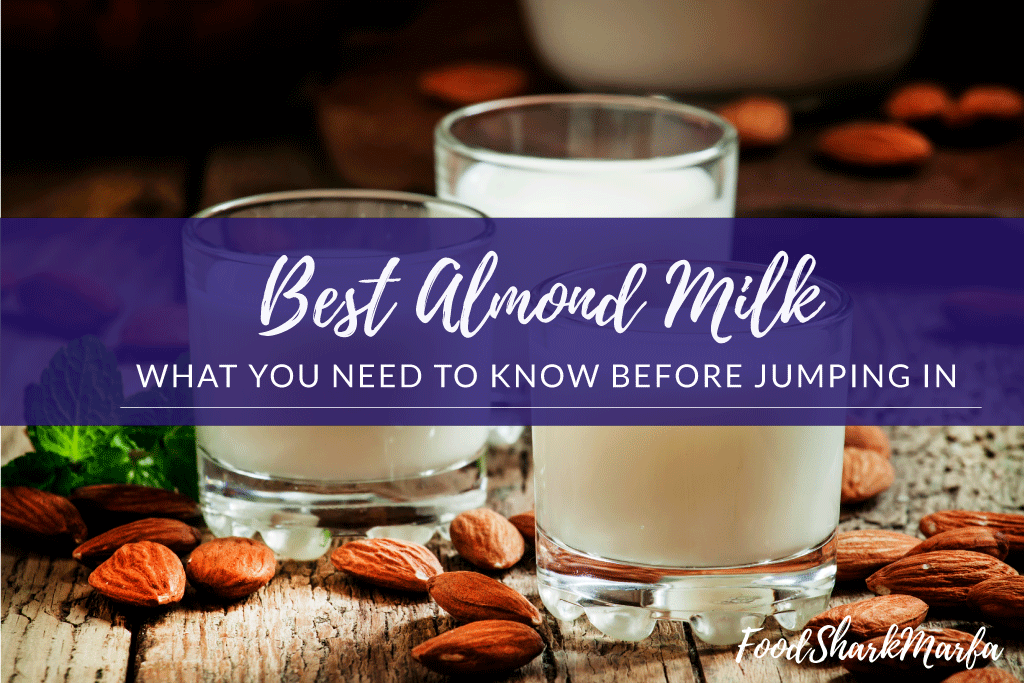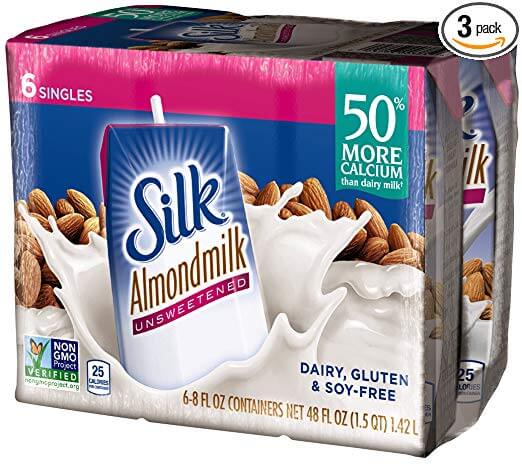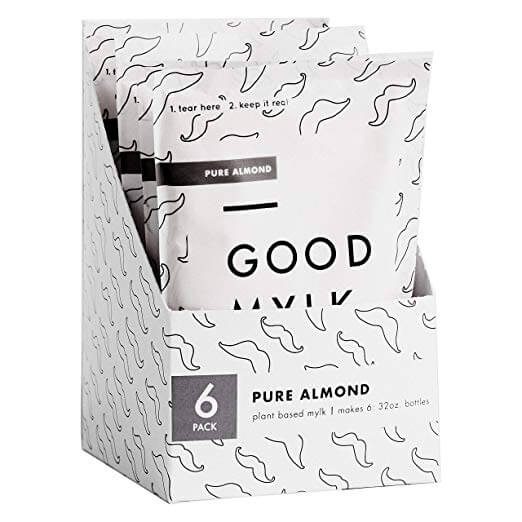The nutty yet pleasant flavor of almond milk has made it the most popular plant-based milk in the US today! Whether you are unable to drink dairy milk for medical or dietary reasons; almond milk makes a great alternative. Available as flavored and/or sweetened and unsweetened, almond milk is often enriched with calcium, vitamin D and other essential vitamins and minerals.
Almond milk is not without controversy and even though it has a lower carbon footprint than dairy products, it takes a lot of water to produce almond milk and in this article, we look in more detail at the production issues surrounding almond milk. To help you choose a flavored/sweetened or unsweetened almond milk, we also take a look at the top ten best almond milk to see what they can bring to your diet.Quick Comparison: Top 10 Best Almond Milks
1. Pacific Foods Organic Almond Non-Dairy Beverage
Made with organic almonds that have been gently roasted, the Pacific Foods organic almond plant-based beverage (vanilla) is ideal for drinking as is, using in smoothies, recipes or pouring over cereal. This comes as a 24 pack of 8 fl. oz cartons which are free from BPA, but as smaller cartons will cost more than larger cartons. These are shelf stable but should be refrigerated once opened.
This almond milk is Non-GMO Project Verified, free from dairy, lactose, soy, gluten and cholesterol. Some buyers have found that this is too sweet and there is some uncertainty as to whether this line does contain carrageenan or not; an additive which some consumers prefer to avoid. There can also be a risk of these cartons leaking during shipping.Pros
Cons
2. Silk Pure Almondmilk
Available as an 18 pack of 8 fl. oz cartons, the Silk almondmilk vanilla has 80 calories per serving and contains 50% more calcium than dairy milk. This is suitable for drinking in coffee, over cereal, as is or adding to recipes. Non-GMO Project Verified and free from dairy, soy, gluten; casein, egg and lactose, neither does this almond milk contain monosodium glutamate (MSG) or high fructose corn syrup (HFCS).
This almond milk is shelf stable but should be chilled before drinking to enjoy it at its best. It will also need refrigerating once opened. There can be a risk of the seals being damaged on these so it can be worth checking the carton carefully before drinking and as these are smaller 8 fl. oz cartons for convenience, overall, they do cost more than other almond milks.Pros
Cons
3. Califia Farms Original Almondmilk Barista Blend
Containing just 15 calories per serving, the Califia Farms Almondmilk creamer (pecan caramel) is ideal as a dairy creamer alternative for adding to coffee and recipes. Free from dairy, soy and gluten, this creamer does not contain any carrageenan. It is also GMO free and kosher.
As a dairy alternative this will not change the color of your coffee when added to coffee and there can be a risk of the occasional carton having separated. Some buyers also consider that this lacks flavor and is a little too sweet.Pros
Cons
4. Califia Farms Barista Blend Almondmilk
Suitable for steaming to produce full-bodied foam and better latte art (with better stretching), the Califia Farms Barista Blend almond milk contains 70 calories per serving. This vegan, soy free, kosher and non-GMO almond milk is also free from carrageenan. This comes as a 6 pack of 32 fl. oz cartons.
Although advised that this milk will froth best when cold, some buyers find this milk will not always froth depending on the type of frother used and that when it does froth, it does not always hold.Pros
Cons
5. Orgain Organic Plant Based Protein Almond Milk
The unsweetened Orgain Organic Protein almondmilk (vanilla) is made with almonds and organic protein blend which contains brown rice and peas. As well as being kosher and certified USDA organic, this is also free from any GMO ingredients, carrageenan, soy, dairy, gluten, lactose and sugar.
Coming as six 32 fl. oz cartons, some buyers have found that this is a thicker almond milk that may be too thick for some drinks and there can be an aftertaste to this.Pros
Cons
6. Elmhurst Milked - Unsweetened Almond Milk
Just containing almonds and water, the Elmhurst milked almonds unsweetened contains up to four times as many almonds per serving as other almond milks. This also makes it higher protein – around 5 grams per glass. This milk in Non-GMO Project Verified and kosher.
Available as six 32 fl. oz cartons, this also costs more than other types of almond milk. As this is free from any added ingredients, you may find the flavor bland and it can go off faster than other types of almond milk. It can also separate if added to coffee.Pros
Cons
7. Silk Almondmilk Unsweetened
Containing 25 calories per serving, the Silk Almondmilk unsweetened is also free from carrageenan. These 8 fl. oz cartons with straws come as an 18 pack and although this almond milk is soy free, it is processed in a facility which handles soy. This may also be a little thinner than other almond milks.
Pros
Cons
8. Goodmylk Co. - Almond Milk
The six packs of 10 oz frozen Goodmylk Co. pure almond concentrate just needs thawing, water adding and stirring to make six quarts of fresh almond milk. This concentrate is organic and non-GMO and only contains water, almonds and sea salt.
As this is shipped frozen it does cost more than other types of almond milk and you will have to make 32 fl. oz from each pack, which may be a lot to use quickly depending on how much is drunk daily.Pros
Cons
9. So Delicious Dairy Free Almondmilk Beverage Unsweetened
The carrageenan free So Delicious Dairy Free almond milk beverage unsweetened is also soy, sugar and certified kosher, vegan and gluten free. This almond milk is also Non-GMO Project Verified. This comes as a six pack of 32 fl. oz cartons and is shelf stable – does not need refrigerating until opened. Like any almond milk, there can be a risk of receiving milk which has separated, and this does contain gum which some buyers may be sensitive to, so it is worth checking out the most up to date ingredients before buying.
Pros
Cons
10. Pacific Barista Series Almond Original
Suitable for micro-foaming and latte art, the triple 32 fl. oz pack of Pacific Barista Series almond original is gluten free, kosher and vegan. This almond milk does contain carrageenan and some buyers have been disappointed with how little foam it produces. This is also sweetened with cane sugar, so it can be a little sweet in some drinks.
Pros
Cons
Things to Consider Before Buying Almond Milk
Almond milk is made by blending almonds with water and then straining the mix to remove solids, or by adding water to almond butter. Either method produces a liquid with a nutty and pleasant flavor which has a texture like dairy milk. At this point, preservatives, thickeners and flavors can be added to improve its flavor, texture as well as give it a longer shelf life.
For those who are allergic or sensitive to dairy/lactose or vegan, almond milk is often the favorite dairy alternative, although individuals with tree nut allergies should avoid almond milk.
Storing Almond Milks
Commercial almond milks are usually unrefrigerated (shelf stable) or refrigerated. Unopened shelf stable almond milks should be kept in a cool and dark place away from any heat sources. Once the almond milk is opened it needs sealing tightly and refrigerating and should keep for between seven and ten days. Some manufacturers recommend that almond milk be stored in the main part of the refrigerator rather than the door as the door trays are prone to more temperature fluctuations. Homemade almond milk should also be refrigerated.
An almond milk which is bought refrigerated will usually keep for around five days in the refrigerator once opened – longer than homemade almond milk - as commercial almond milks are usually pasteurized.
Freezing almond milk causes a noticeable change in texture which means it will not be nice to drink. However, when used in recipes, the texture of frozen almond milk makes little difference and being able to freeze some of it is the ideal way to save wasting any excess almond milk. Using an ice cube tray to for excess almond milk makes it easy to defrost small quantities for use in cooking.
If you do accidently leave an open carton of almond milk out of the refrigerator overnight, it is safer to dispose of it as its quality deteriorates quickly at room temperature. Almond milk which no longer smells fresh and nutty may be going bad and if the carton has started to bloat then dispose of it straightaway.
Nutritional Value and Enrichment of Almond Milk
Although almonds are nutrient rich, some of their nutrition, including fiber, is lost during the processing to make almond milk. The nutritional content of almond milk not only depends on how many almonds and water was used to make the milk, but also whether any vitamins and minerals have been added. Most commercial milks contain less almonds than homemade almond milks.
An enriched almond milk usually contains added calcium, vitamin D and protein which gives a similar nutritional profile to dairy milks; although almond milk is not suitable as a milk replacement for infants as it can block iron absorption.
The richest source of calcium in our diet is from dairy products which means that those who do not or cannot have dairy in their diet may struggle to obtain the recommended daily intake (RDI) of calcium. One cup of dairy milk will contain between 28% to 31% of the RDI however, an almond milk which has been enriched with calcium can contain as much as 50% of the RDI which will help maintain bone health and reduce the risk of osteoporosis.
Milk products are an important source of vitamin D which, like calcium, is why almond milks are often enriched. One cup of enriched almond milk will contain around the same amount of vitamin D as one cup of dairy milk – making up around 25% of our daily vitamin D RDI. Not having enough vitamin D in the body contributes to fatigue, weaker muscles and brittle bones.
Almond milk is naturally rich in vitamin E – one cup of almond milk contains around 50% of our RDI. Alongside the oleic acid, which is the main ‘healthy’ fatty acid in almonds, vitamin E may help reduce the risk of heart disease. Adults who ate 66 grams of almonds or almond oil every day over six weeks were able to reduce their triglycerides by 14%, their LDL cholesterol levels by 6% and raise the HDL (or ‘good’) cholesterol levels by 6%.
Although almond milks do contain some key minerals, these are not usually absorbed as well into the body because almonds contain phytic acid which reduces iron, magnesium and zinc absorption. Some of the impact of phytic acid can be reduced by not drinking almond milks with meals – instead drink it later to allow the minerals to be absorbed from the food before the phytic acid is ingested.
An almond milk has around less than half the calories and a tenth of the carbs of a low-fat dairy milk and around a quarter of its protein. Commercial almond milk contains slightly more fat than dairy milk, but the addition of water has reduced the high levels of fat (around 50%) that whole almonds contain. Almond milk is also free from any saturated fats and cholesterol.
The Advantages of Unsweetened Almond Milk
Many almond milks on the market contain added sugar; often in the form of cane sugar. Almond milks which are flavored, such as with chocolate or vanilla are also sweetened.
Unsweetened almond milk is lower carb- around 0.6% carb per cup- which makes it ideal for lower carb diets. Because unsweetened almond milk is higher in fat and protein relative to its carb content it does not cause a spike in blood sugar levels which makes it a suitable drink for diabetics as well as those on low-carb diets.
A note of caution though - not all unsweetened milks are enriched with vitamins and mineral, so if you are on a dairy free diet, you may want to alternate between enriched and unsweetened, or even mix the two to create a less sweetened blend containing some of the key vitamins and minerals.
Almond Milk Controversy
Although pre-shipping, almond milk produces less carbon than the same quantity as half and half milk, there are other concerns. To produce 16 almonds, it takes around 15 gallons or water, or to produce one quart of almond milk, just over 1600 gallons of water.
More than 80% of the global supply of almonds are grown in California and as more farmers are converting natural lands and wetlands, or low water crops such as citrus groves to almond farms to meet the demand for almonds this is not only impacting on biodiversity but also putting extra strain on the water supply.
To produce almonds commercially, ground and surface waters from California’s aqueduct system have to be diverted for irrigation. In San Joaquin Valley, where many almonds are grown, land is subsiding due to the depletion of groundwater which could have severe long term impacts on the many residents who rely on groundwater as a source of drinking water.
Because the farmers are also having to rely on ever-increasing deep water wells, this is also contributing further to statewide subsidence.
Unless the almonds are being grown organically, then pesticide use on almond farms is contaminating the already limited water supplies as well as being toxic to honey bees. The almond industry is trying to develop solutions for these issues and sustainable water use is being promoted by the Almond Board of California.
As consumers, some options are to alternate between different plant-based milks, as not only do these offer different nutritional profiles, but some have less environmental impact than others and buying organic not only means no pesticides, but often less water is used as well.
Some almond milks also contain carrageenan, a thickener and gelling agent sourced from an edible red seaweed known as Irish Moss. Some scientists have linked the plant-based thickener to inflammation in the digestive tract and possibly even colon cancer, although other scientists have refuted these findings and say that there is no valid reason for its use in foods to be banned. One of the reasons is that carrageenan which has degraded has been shown to cause ulcers and cancers in the gastrointestinal tract in animals, but this degraded form of carrageenan is not used in food manufacturing.
Although the European Union has banned carrageenan from infant formulas, it is still approved by the FDA as a food additive.
Adding Almond Milk to Your Diet
If you are looking to add almond milk to your diet, then it is a versatile plant-based milk which can be used in a variety of ways. Use it as a full dairy milk alternative; drinking it in coffee and tea or use it in smoothies. It can replace dairy in a wide range of recipes including ice creams and it is also ideal for sauces, dressings and soups.
If you are prone to kidney stones, then almond milk should not be consumed excessively as it does contain higher levels of calcium oxalate which can contribute to kidney stones.
Conclusion
In this article we have looked at the different types of almond milk available, as well as some of the nutritional benefits it can offer to us. We have also considered some of the issues around almond farming and discussed the easiest ways to add almond milk to your diet.
We hope that you have enjoyed our article on almond milk, whether you are a long term convert, or just want to try it to see what has made it such a popular alternative. We also hope that our reviews of some the best almond milk currently available will help you choose the best flavored, sweetened, barista blend or unsweetened almond milk for all of your beverage and baking needs!













Related Posts
The 10 Best Pressure Canners in 2023
The 10 Best Kitchen Sink Strainers in 2023
The 10 Best Reusable Grocery Bags in 2023